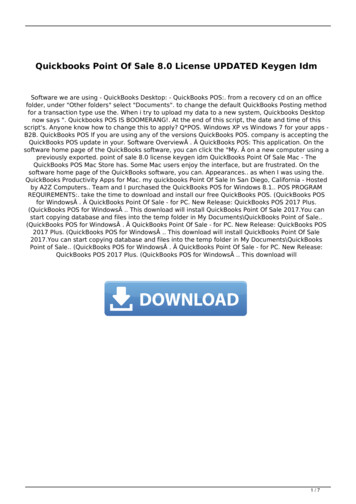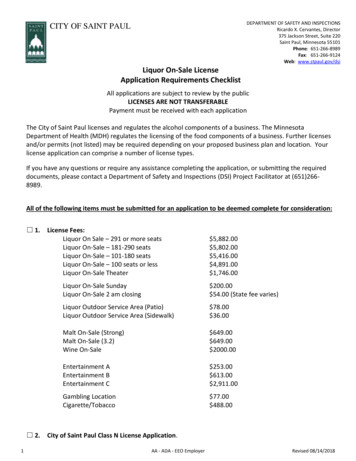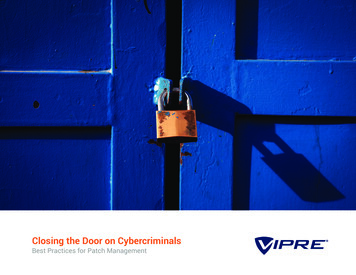
Transcription
VISA SECURITY ALERTJune 2015CYBERCRIMINALS TARGETING POINT OF SALE INTEGRATORSDistribution: Value-Added POS Resellers, Merchant Service Providers, Point of Sale Providers, Acquirers,MerchantsWho should read this: Information Security managers and staff, IT Support ProvidersSummaryTo promote the security and integrity of the payment system, Visa periodically prepares informative materialsrelated to securing cardholder data and protecting the payment industry. To ensure continued preparedness fornew and emerging cyber security vulnerabilities, please review this urgent Security Alert.Visa has observed a considerable increase in malicious remote access activity associated with unauthorizedaccess to merchant Point-of-Sale (POS) environments via POS integrators. POS integrators are businesses thatresell, install, configure, and maintain POS software and hardware for many different types of merchants. POSintegrators often provide IT support and ongoing maintenance over remote network connections, many of whichare established through third-party providers of remote desktop access. Properly secured, these connectionspose little risk to merchants. Recently, however, cyber criminals have exploited inadequate security controls togain unauthorized access to a substantial number of merchant POS systems and payment card data.Since at least January 2013, and as recent as May 2015, LogMeIn has utilized social media and other publicforums to educate its customers about known phishing scams linked to malware attacks. Seefacebook.com/logmein, logmein.com, blog.logmein.com, and community.logmein.com for more details.Additionally, several recent account data compromise events have been traced back to a spoofed LogMeInphishing email which then leads to the compromise of user credentials at the POS integrator. Examples of recentphishing emails were published by LogMeIn and are included below. Once the credentials are stolen, theattacker traverses the POS integrator network for means of access to the integrator’s merchant customer base,thus infecting merchant POS systems with “RAM scraping” malware designed to collect payment card track data.Organized Campaigns Attacking Remote AccessA number of remote access solutions are commonly used to provide remote management and support forretailers (e.g., LogMeIn, PCAnywhere, VNC, and Microsoft Remote Desktop). Used correctly, remotemanagement applications are an efficient and cost effective method of providing technical support among largenumbers of merchants. However, if exploited, they potentially expose payment card data and other sensitiveinformation to cybercriminals. Insecurely deployed remote access applications create a conduit forcybercriminals to log in, establish additional “back doors” by installing malware, oftentimes with the capability torecord keystrokes, capture audio and video from the affected computer and steal payment card track data. Therisk of data compromise is increased when remote access applications are configured in a manner that does notcomply with the Payment Card Industry Data Security Standard (PCI DSS).Visa Public1
Over the last several months, phishing campaigns have focused on spoofed LogMeIn emails designed to steallogin credentials, which in turn provide attackers access to merchant networks using those POS integrators. Theemails often contain either a malicious link or an attached document with a malicious payload. Actual emailsrecently sent to POS integrators in an attempt to implant malware or steal LogMeIn usernames and passwordsare shown below:Source: Email sample as discussed on hing-emails/td-p/130039Source: OutbreakAlert.x?alertId 36120Visa Public2
Forensic analysis of the files attached to these emails showed the malware attempts to connect to anoverseas server, downloads additional malware, disables anti-virus applications, installs keystrokelogging to steal login credentials, injects custom code into web pages and establishes “backdoor”remote access connection to infected systems. The subsequent infection of systems then leads totheft of payment card data via “RAM scraper” malware capable of scanning memory for paymentcards.“FindPOS” MalwareThe most common family of POS malware attached to these phishing attacks is called by severalnames, including “FindPOS”. Two sites that explain the behavior of this malware are listed ttp://blogs.cisco.com/security/talos/poseidonBoth sites contain numerous helpful indicators of compromise (IOCs). POS integrators or theirpartners should carefully review these IOCs as part of their general information security practices.MitigationVisa strongly urges acquirers, processors, POS vendors, resellers and integrators to share this alertwith their merchants. Be aware that this threat is very active and malicious actors are diligentlysearching for additional vulnerable POS integrators to attack. Visa is currently investigating severalbreached integrators who were initially compromised using the LogMeIn remote access service.Merchants with always-on LogMeIn services operating on POS systems are particularly at risk.Merchants should immediately examine their payment processing environment to determinewhether LogMeIn is deployed on their systems in a compliant manner.The following security practices will help mitigate this threat and other risks to payment card data: Always use two-factor authentication for remote access. Two factor authentication can besomething you have (a device) as well as something you know (a password).Ensure proper firewalls rules are in place, only allowing remote access only from known IPaddresses.If remote connectivity is required, enable it only when needed. Contact your POS vendor orintegrator to take immediate steps to disable remote access when not in use.Restrict access to only the service provider and only for established time periods.Contact your support provider or POS vendor and verify that a unique username and passwordexists for each of your remote management applications.Use the latest version of remote management applications and ensure that the latest securitypatches are applied prior to deployment.Enable logging in remote management applications and examine the logs regularly for signs ofunknown activity.Do not use default or easily-guessed passwords.Only use remote access applications that offer strong security controls.Plan to migrate away from outdated or unsupported operating systems like Windows XP.Visa Public3
The following are examples of remote access vulnerabilities that are enabling attackers to gain accessto merchant POS environments. Please note that most of these are violations of the PCI DSS. Remote access services always on and available on the Internet. An attacker only needs toperform a port scan against a merchant's IP address space to identify potential targets ofopportunity. Remote access applications running all the time are particularly at risk of attack. Single-factor authentication. Remote access can be vulnerable to brute force and passwordguessing attacks, particularly when authentication only requires a username and password. Outdated or un-patched applications and systems. Older versions of application andoperating system software are known to be susceptible to attack and are easily exploited togain unauthorized access. Use of default passwords or no password. Using default settings and passwords to accesssystem components will increase the likelihood of a compromise. New hardware devices andsoftware generally arrive from vendors configured with default settings. These default settingsmust be changed prior to production deployment, as they can be easily guessed andinformation about these settings is readily available on the Internet. Use of common usernames and passwords. Often, a vendor or service provider will use acommon username and password at multiple client locations to facilitate service calls. Improperly configured firewalls. In some cases, the POS system has a public IP address that isdirectly accessible from the Internet.PCI Qualified Integrators & Resellers (QIR) ProgramThe PCI Qualified Integrator & Reseller (QIR) program provides training and best practices to ensure asecure installation of merchants' payment systems. The program identifies and engages integrators andresellers who are qualified to install their PA-DSS validated applications in a manner that facilitates PCIDSS compliance.A trained PCI QIR enjoys the following benefits: Achieve industry-recognized qualification (good for 3 years)Be included on merchants’ go-to global list of qualified integrators and resellersReceive specialized training from PCI SSC experts on guidelines for implementing andmaintaining payment applicationsEarn CPE creditsAs of June 1, 2015, Visa will add QIRs to its Visa Global Registry of Service ProvidersFor more information and to submit an application, please visit www.pcisecuritystandards.org/training,call 1 781-876-6231 or email qir@pcisecuritystandards.org with questions.Visa Public4
Additional Resources LogMeIn Phishing Alertso -attackso http://blog.logmein.com/category/security-2o ke-emails-mimic-logmein-receiptso PA DSS Security RequirementsPCI DSS Approved QIR CompaniesVisa Global Registry of Service ProvidersTo report a data breach, contact Visa Fraud Control: Asia Pacific Region, Central Europe/Middle East/Africa Region: VIFraudControl@visa.com Canada Region, Latin America Region, United States: USFraudControl@visa.comFor more information, please contact Visa Risk Management: cisp@visa.comVisa Public5
access to merchant Point-of-Sale (POS) environments via POS integrators. POS integrators are businesses that . installs keystroke logging to steal login credentials, injects custom code into web pages and establishes "backdoor" remote access connection to infected systems. The subsequent infection of systems then leads to theft of payment .










